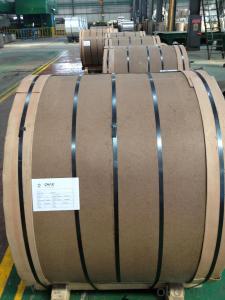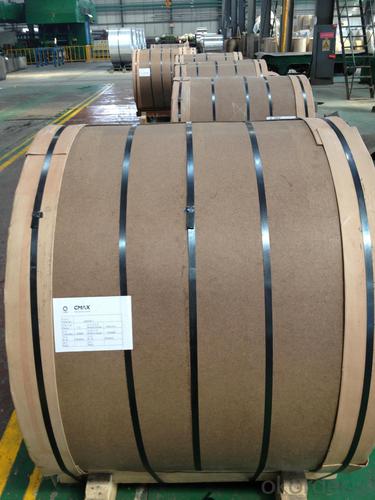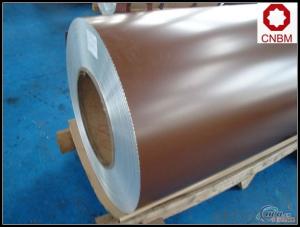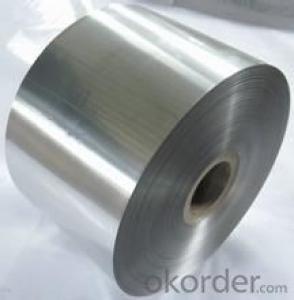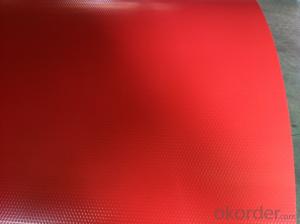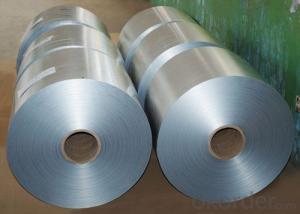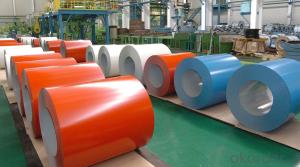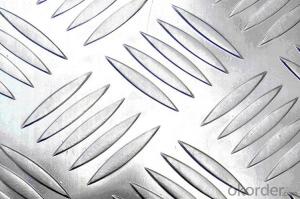Ruud Aluminum Coils - 2.4mm Aluminium Coil
- Loading Port:
- China Main Port
- Payment Terms:
- TT OR LC
- Min Order Qty:
- -
- Supply Capability:
- -
OKorder Service Pledge
Quality Product, Order Online Tracking, Timely Delivery
OKorder Financial Service
Credit Rating, Credit Services, Credit Purchasing
You Might Also Like
Specifications
1:mill finish aluminum coil
2:ISO9001,SGS,CCS test certificate
3:Width can reach 2500mm.
4:DC and CC material is available.
mill finish aluminum coil
| Product | Aluminum Coil |
| Alloy | 1050, 1060, 1070,1080,1085,1100, 1200,1145 3003, 3004,3005, 3102,3103,3104,3105, 3A21 5052,5052A,5657, 5754,5082,5083,6061,7075,8006,8011,8079 |
| Temper | O, H12, H14, H16,H18 H22,H24,H26,H28,H32,H34,H36,H38 |
| Thickness | 0.2mm-7.0mm(Or Customer's requirement) |
| Width | Under 2500mm |
| Lead Time | Within 20 days after receiving deposit |
| Packing | Standard Exporting wooden pallets |
| Surface: | Bright & Smooth Surface, Free from defects like white Rust, Oil Patch, Edge Damage. |
| Application | PP cap stock, hot rolled thick plate, PS base plate, aluminum curtain wall base plate, the traffic sign ,air-conditioner heat and exchangers, food container, household foil, pharmaceutical packing, cigarettes packing, |
- Q: This question asks for criteria or methods to determine if an aluminum coil is of high quality.
- <p>To identify a high-quality aluminum coil, consider the following factors: purity level, which should be 99.5% or higher for most applications; surface finish, ensuring it's smooth and free from defects; thickness consistency, which should be uniform across the entire coil; mechanical properties, such as tensile strength and elongation, that meet industry standards; and adherence to specific alloy grades for particular applications. Additionally, check for certifications from recognized standards organizations and consider the supplier's reputation for quality and consistency.</p>
- Q: Can aluminum coils be used in the production of kitchen utensils?
- Kitchen utensils can indeed incorporate aluminum coils in their production. Aluminum is a favored material for kitchen utensils owing to its lightweight nature, durability, and ability to conduct heat. Aluminum coils are effortlessly malleable, allowing them to take on various forms and designs for utensils like pots, pans, baking trays, and even cutlery. Moreover, aluminum possesses resistance against corrosion, making it a suitable choice for contact with food and liquids. Nevertheless, it is essential to keep in mind that aluminum utensils may require a non-stick coating or a protective layer to prevent any adverse reactions with acidic or alkaline foods. Ultimately, owing to their adaptability and practicality, aluminum coils are extensively employed in the production of kitchen utensils.
- Q: How are aluminum coils tested for surface cleanliness?
- To ensure that aluminum coils meet the required standards, various methods and techniques are employed to test their surface cleanliness. One commonly used method is the water break test, where a clean water droplet is placed on the coil's surface. If the water spreads out evenly and forms a continuous film without beading or breaking, it indicates that the surface is clean and devoid of any contaminants. Another approach involves the solvent wipe test, where a wipe soaked in solvent is gently rubbed on the coil's surface. The wipe is then examined for any dirt or residue, indicating the presence of contaminants on the surface. Furthermore, surface energy measurement is carried out to assess the cleanliness of aluminum coils. This entails using a contact angle measurement device to measure the coil's surface energy. A high surface energy suggests a clean surface, while a low surface energy indicates the presence of contaminants. Moreover, visual inspection is commonly employed to detect any visible dirt, oil, or other foreign substances on the coil's surface. This can be done using a magnifying glass or under specific lighting conditions to ensure a thorough examination. In conclusion, a combination of these methods is utilized to evaluate the cleanliness of aluminum coils, ensuring that they are free from contaminants and suitable for further processing or use in various industries.
- Q: Do you have an aluminum coil first? Is there an aluminum plate?
- Yes, all aluminium sheets are made of aluminium rolls after slitting.
- Q: How are aluminum coils priced?
- Aluminum coils are typically priced based on various factors such as the current market price of aluminum, the size and thickness of the coil, the quantity ordered, and any additional customization or processing requirements. Additionally, factors like transportation costs and market demand can also influence the pricing of aluminum coils.
- Q: What is the maximum coil diameter for aluminum coils?
- The maximum coil diameter for aluminum coils can vary depending on the specific application and manufacturing process. However, in general, the maximum coil diameter for aluminum coils typically ranges from 60 inches (152.4 cm) to 120 inches (304.8 cm). This diameter limit is determined by factors such as the size of the production equipment, the thickness and width of the aluminum sheet being processed, and the handling capabilities of the facility. It is important to consult with the manufacturer or supplier to determine the specific maximum coil diameter for a particular aluminum coil product.
- Q: Describe the steps involved in the production of aluminum coil.
- <p>The process of making aluminum coil involves several key steps. Initially, raw materials, typically bauxite ore, are mined and then refined to produce aluminum oxide. This aluminum oxide is then reduced to aluminum metal through the Hall-H茅roult process, where it is dissolved in molten cryolite and electrolyzed to extract aluminum. Once the aluminum is produced, it is melted and then continuously cast into large slabs or billets. These slabs are then hot or cold rolled to reduce their thickness and width, forming coils. The coils are annealed to improve their mechanical properties and surface finish. Finally, the aluminum coils are cleaned, inspected, and cut to size before being packaged and shipped to customers for various applications such as construction, automotive, and packaging.</p>
- Q: Can aluminum coils be utilized as materials for constructing roofs?
- <p>Yes, aluminum coils can be used for roofing materials. They are known for their durability, corrosion resistance, and lightweight properties, making them an excellent choice for roofing. Aluminum's reflective surface also helps in energy efficiency by reflecting sunlight and reducing heat absorption. It's recyclable and has a long lifespan, which contributes to its sustainability. However, it's important to ensure that the aluminum coils are of the appropriate gauge and quality for the specific roofing application to guarantee structural integrity and performance.</p>
- Q: What are the common industry standards for aluminum coil specifications?
- The common industry standards for aluminum coil specifications are established by various organizations such as the Aluminum Association (AA) and the American Society for Testing and Materials (ASTM). These standards ensure uniformity and consistency in the manufacturing and use of aluminum coils across different industries. The Aluminum Association (AA) sets the standards for aluminum alloys and their respective temper designations. The AA standards classify aluminum alloys based on their chemical composition and mechanical properties, allowing manufacturers to produce coils with specific characteristics suitable for different applications. For example, AA 3003 is a commonly used alloy for general-purpose coils, while AA 5052 is often used for marine applications due to its higher corrosion resistance. In addition to alloy classification, the AA also provides guidelines for coil dimensions, tolerances, and surface finishes. These specifications help ensure that aluminum coils meet the required dimensions and quality standards, allowing for easy integration into various manufacturing processes. The American Society for Testing and Materials (ASTM) also plays a significant role in setting standards for aluminum coil specifications. ASTM provides guidelines for various tests and procedures to assess the quality and performance of aluminum coils. These tests include mechanical property testing, such as tensile strength and elongation, as well as tests to evaluate surface finish, corrosion resistance, and dimensional stability. Furthermore, industry-specific standards may exist for certain applications. For example, the automotive industry may have its own set of standards for aluminum coils used in vehicle manufacturing, ensuring compliance with specific performance requirements. Overall, the common industry standards for aluminum coil specifications encompass alloy designation, dimensional tolerances, surface finishes, and mechanical properties. Adhering to these standards ensures consistency, quality, and compatibility across different industries and applications.
- Q: Is there aluminum coil of 44mm wide and 0.40mm thick?
- The common width of aluminum coil is 1000mm or 1220mm. If you want 0.4mm*1000MM aluminum coil, you can strip 0.4mm*1000MM aluminum coil.
Send your message to us
Ruud Aluminum Coils - 2.4mm Aluminium Coil
- Loading Port:
- China Main Port
- Payment Terms:
- TT OR LC
- Min Order Qty:
- -
- Supply Capability:
- -
OKorder Service Pledge
Quality Product, Order Online Tracking, Timely Delivery
OKorder Financial Service
Credit Rating, Credit Services, Credit Purchasing
Similar products
Hot products
Hot Searches
Related keywords
